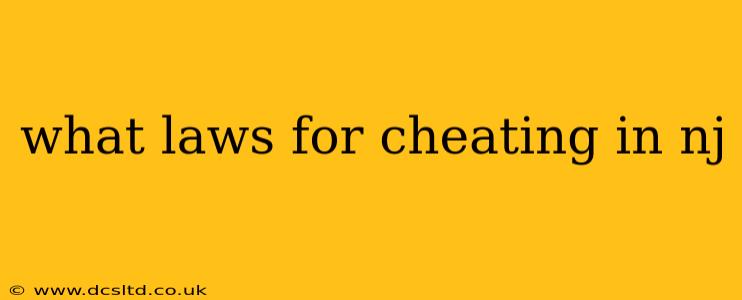What Laws Exist for Cheating in New Jersey?
New Jersey, like many states, doesn't have a single, broadly defined "cheating" law. Instead, the legality of cheating depends heavily on the context in which it occurs. Cheating can lead to various legal consequences depending on the specific situation, ranging from minor infractions to serious felonies. Let's break down some common scenarios and the relevant laws:
Academic Cheating:
While not a criminal offense in itself, academic dishonesty in New Jersey schools and universities can result in serious consequences. These consequences can include failing grades, suspension, expulsion, and even revocation of degrees. The specific policies vary depending on the institution. Universities have detailed academic integrity policies outlining prohibited actions like plagiarism, collusion, and unauthorized use of materials during exams.
Cheating on Tests and Exams (Beyond Academic Settings):
This area is less clear-cut legally. While there's no specific "cheating on a test" law, depending on the context, actions could fall under existing statutes. For example, if someone fraudulently obtains a driver's license or professional certification through cheating, they could face charges related to fraud, forgery, or perjury.
Financial Cheating (Fraud):
This is where New Jersey law gets much more specific. Numerous statutes address various forms of financial cheating, including:
- Insurance Fraud (N.J.S.A. 17:33A-1 et seq.): Making false statements to obtain insurance benefits or defrauding an insurance company is a serious crime with severe penalties.
- Bank Fraud (18 U.S.C. § 1344): Though a federal crime, bank fraud within New Jersey jurisdiction will be prosecuted under federal law, leading to significant fines and imprisonment.
- Welfare Fraud: Receiving welfare benefits fraudulently is a crime punishable by fines and jail time.
- Tax Fraud (N.J.S.A. 54A:9-1 et seq.): Failing to pay taxes, underreporting income, or claiming false deductions are serious offenses with potentially harsh penalties.
- Credit Card Fraud (N.J.S.A. 2C:21-6): Unauthorized use of a credit card or obtaining credit fraudulently is a crime.
- Securities Fraud (N.J.S.A. 49:3-44, 49:3-53): Misrepresenting securities or engaging in fraudulent activities related to the sale or purchase of securities is a crime.
These are just examples, and the specific charges and penalties will depend on the nature and scale of the fraudulent activity.
Sports Cheating:
While not a direct criminal offense in itself, depending on the circumstance, sports cheating could lead to criminal charges. For instance, if a game is fixed through bribery or other criminal activities, those involved could face charges related to bribery, conspiracy, or other relevant offenses.
Workplace Cheating:
Cheating in the workplace could involve theft, time card fraud, or falsification of records. These actions could be considered crimes depending on their nature and severity and could lead to both criminal and civil penalties.
What are the Penalties for Cheating in New Jersey?
Penalties for cheating vary dramatically depending on the context. They range from:
- Academic settings: Failing grades, suspension, expulsion.
- Minor infractions: Fines.
- Serious offenses (fraud, theft): Significant fines, imprisonment, and a criminal record.
It's crucial to consult with a legal professional to understand the potential consequences of specific actions considered "cheating" in a particular situation. The information provided here is for general informational purposes only and does not constitute legal advice.
Disclaimer: This information is for educational purposes only and should not be considered legal advice. For legal counsel specific to your situation, consult with a qualified attorney in New Jersey.
